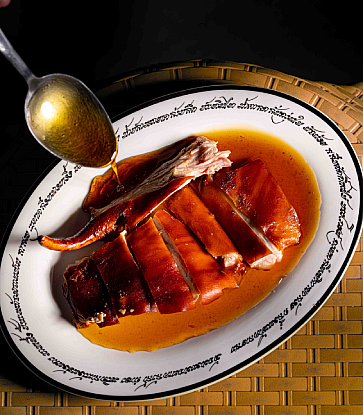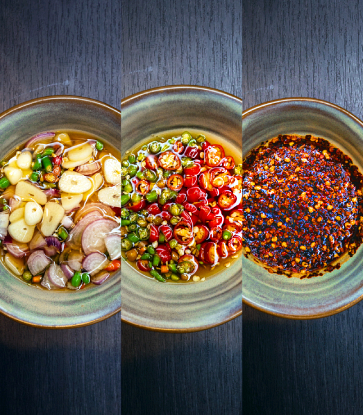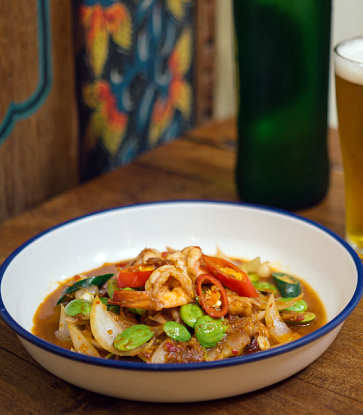You can travel to plenty of top-notch restaurants for gastronomic pleasure. However, only a handful shine in terms of sustainability. In a world where everyone feels the heat of the climate crisis, we invite you to become a green hero.
These chefs from MICHELIN Green Star restaurants in Thailand will inspire you with their sustainability practices and share tips on how to make your everyday life greener.

Deepanker ‘DK’ Khosla
Haoma, Bangkok (One MICHELIN Star and MICHELIN Green Star, MICHELIN Guide Thailand 2024)As the first restaurant in Bangkok to receive a MICHELIN Green Star, sustainability is Haoma’s core philosophy. You will find sustainability in every step – from sourcing, to menu creation, to decoration. Haoma’s Executive Chef Deepanker Khosla, or Chef DK, believes zero waste isn’t just only producing no waste. It starts by preventing everything that comes into the kitchen from becoming one. Thus, the restaurant has put processes in place to minimise possible waste from the kitchen, including turning parts that are usually disposed of into delicious dishes. If there is still waste, some of it will be turned into feed for over 500 fish in the restaurant’s pond, where the pristine water comes from rainwater conservation. If waste remains, it will be used as fertiliser for the herb garden and sent to their 5-rai (0.008 km2) farm in Ladkrabang.
Chef’s green tips: “The eggshell you think of throwing away is a great source of calcium and phosphorus for plants and pets. Sun-dry the shell for 2-3 days or bake it at 60°C until it dries. Grind and mix with soil for plant fertiliser or with your pet food for extra nutrition.”

Jimmy Ophorst
PRU, Phuket (One MICHELIN Star and MICHELIN Green Star, MICHELIN Guide Thailand 2024)This fine dining establishment of Phuket’s Trisara has been focusing on sustainability since its first day. In addition to alluring appearances, Chef Jimmy Ophorst’s contemporary approach to cooking stays true to the vision of sustainability for future generations. The Netherlands’ respect for local Thai ingredients is also apparent. He works with farmers, fishermen, and small-scale producers throughout Thailand to support sustainable production. Examples include catching fish with baits instead of nets and free-range poultry. PRU also has its organic farm, from which the produce is transformed into seasonal dishes. PRU isn’t only a beloved restaurant. It has been a part of the forces driving Phuket to become a gastronomic destination and inspiring people to adopt sustainable consumption.
Chef’s green tips: “Make a good ventilation system so fresh air can flow in. This helps reduce the use of air-conditioners. Try to use fewer plastic bags. Bring reusable bags to supermarkets. Compost organic waste. Conserving rainwater for plants will help reduce the use of city water big time. Plant more trees in your garden and home. They will increase oxygen and reduce carbon dioxide at the same time. Think carefully before you do something. Big changes come from small steps.”

Rick Dingen
Jampa, Phuket (Recommended and MICHELIN Green Star, MICHELIN Guide Thailand 2024)Rick Dingen’s experiences at Amsterdam’s De Kas and Bangkok’s Haoma instilled in him a passion for sustainability. After several years at both MICHELIN-starred restaurants, he established Jampa in Phuket. The restaurant was founded on 3 core philosophies, including Best of Season, Zero Waste, and Farm to Fork. The restaurant’s operations aim to minimise the impact on the environment by practising responsible waste management to reduce carbon dioxide emissions and composting food waste for use in Pru Jampa Farm. The farm in collaboration with Pru also strengthens the relationship with local farmers. Jampa’s efforts are deserving of the MICHELIN Green Star.
Chef’s green tips: “Try your own sustainable farming. Plant herbs or organic vegetables in your backyard or corridor. They’ll help absorb carbon dioxide and reduce your trips to grocery stores. Try reducing food waste by preserving or turning leftover ingredients into foods such as pickles, chutney, jam, sauce, etc. Start adopting solar power for your home and garden. Installing solar cells is a simple step that saves both money and the environment.”

Chef Amerigo Sesti and Chef Nicolas Keller
J'AIME by Jean-Michel Lorain, Bangkok (Recommended and MICHELIN Green Star, MICHELIN Guide Thailand 2024)If you think French haute cuisine requires imported ingredients, think again. J'AIME by Jean-Michel Lorain has attempted to develop eco-friendly approaches for the perfect delivery of classic dishes in this equatorial country. The approaches minimise the need for imported ingredients. When Chef Nicolas Keller recently took the helm, he continued what Chef Amerigo Sesti started. Together, they’d like to share practical tips on how you can be a green hero.
Chef’s green tips: “Food is precious. Don’t waste it. Bad habits lead to waste, which then leads to pollution. Some products have more negative impacts than they are worth. Often, they’re not necessary. Balance your diet. Use utmost care when choosing your products. Support local farms or community enterprises. Minimise the use of processed products. This will encourage you to explore more varieties in local markets and help you learn how to cook seasonally. Everything I mentioned helps reduce carbon emissions from transportation and supports small-scale producers.”
“Reduce the use of industrial products and plastic. Turn leftover vegetables and peels into broth or soup. Boil them with herbs and spices. You’ll get a tasty and nutritious broth that you can portion and freeze for future consumption. Use this broth instead of industrial broth that comes in single-use packaging. This will also reduce the use of plastic.”
Don’t forget to apply these useful tips in your daily routines. Whenever you look for restaurants or groceries, focus on those supporting sustainability. Our collective help can drive a better change for the world.
For updates on travel destinations, contact TAT Call Centre 1672, or Facebook TAT Contact Centre. For information on Sustainable Tourism Acceleration (STAR), log in to www.TATStar.org, or Facebook: tatstar.green.
Illustration image © PRU, Anuwat Senivansa Na Ayudhya/ MICHELIN Guide Thailand, Jampa, J'AIME by Jean Michel Lorain













%20-%20Aman%20Nai%20Lert.jpg)
.jpg)




